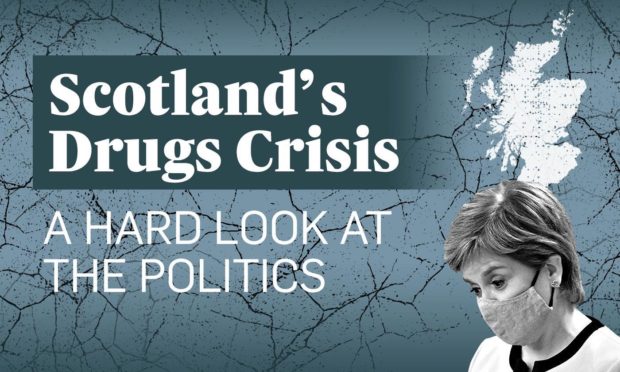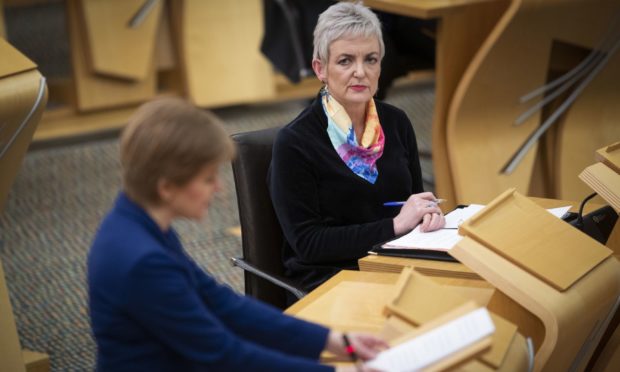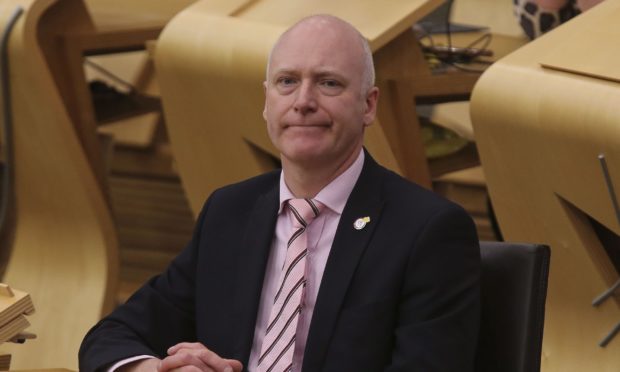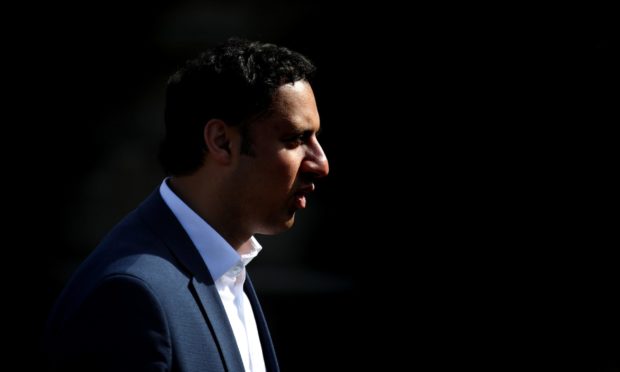Nicola Sturgeon met a furious backlash when she admitted the SNP Government had fallen short of tackling a national drug-death shame.
She scrambled to undo the damage shortly before the Holyrood election, saying the phrase – “we took our eye off the ball” – did not mean her administration “didn’t bother” to address the health emergency.
But the comment touched a nerve and underlined how a social scandal had slowly been allowed to develop over years of cuts, missed opportunities and political distractions.
The latest annual report, looking back over 2020, was published on July 30 showing another record death toll. A glance at the historical annual figures shows how badly the problem has grown.
In the year 2000, shortly after the Scottish Parliament was established at Holyrood, 292 drug-related deaths were recorded. By 2019, the number had rocketed to 1,264.
In recent months, the failure to turn around shockingly high death figures cost Joe FitzPatrick his job as an SNP minister for public health.
He was returned to Holyrood by voters in Dundee – the Scottish city suffering the most acute problem – with an increased majority in May.
His successor in government, Angela Constance, has a tough job to make any sort of quick impact. Her political opponents were quick themselves to point out she was previously shuffled out of top ministerial roles in education and social security.
I just don’t think we’ve done enough right, perhaps, than doing it wrong.”
– Nicola Sturgeon
Drugs, alcohol and deprivation
For a snapshot of political progress, look at alcohol problems. Scotland has a bad relationship with drink, and it has been a high-profile challenge for Holyrood.
Policies such as minimum pricing and major health campaigns have clearly helped. While drug deaths increased over time, alcohol-related deaths fell, as did consumption.
Inequality across Scotland’s communities is another stubborn problem politicians cannot seem to crack. The link between problem drug use and deprivation is well understood.
A report from public spending watchdog Audit Scotland identified long-term issues on those areas just over a year ago.
Crucially, it identified what was being spent.
Funding for Alcohol and Drug Partnerships, set up in 2010, was transferred from the justice department to health in 2015. Audit Scotland said that led to a 22% reduction in funds over a year. The shortfall was meant to be met from health budgets, but half of NHS boards reduced funding support in 2016-17.
Talking shops?
Expert groups and strategies have come and gone over the years, while the reviews and studies continued.
The Road to Recovery, published in 2008, was adopted at a time when the SNP’s Alex Salmond was leaning on Conservatives for help in his minority government.
Rights, Respect and Recovery came along in 2018 as the next national drug and alcohol strategy published.
There was more concerted pressure from beyond government – from experts in the field and media campaigns, including hard-hitting commentary from Scottish rapper and author Darren McGarvey.
Meanwhile, government ministers were accused of allowing residential rehab to fall away.
By the end of the last parliamentary session, Ms Sturgeon was apologising for failures and announcing massive investment, seen as reversing past cuts.
My thanks to @JoeFitzSNP for his service as Public Health Minister. I’ll seek @ScotParl approval for appointment of @AConstanceSNP as Minister for Drugs Policy, reporting directly to me. We’re determined to tackle the drugs crisis. I will confirm new Public Health Minister soon. https://t.co/xSL0Vvfvrk
— Nicola Sturgeon (@NicolaSturgeon) December 18, 2020
Scotland’s drug laws
The new budget includes £20m a year for residential rehabilitation and “significant” funds for alcohol and drug partnerships.
Opposition parties have been pointing out the problems for years, but the death tolls were also rising under previous Labour-Lib Dem executives.
Now, Scottish Labour leader Anas Sarwar says the crisis is a public health emergency. He backs the SNP’s support for safe consumption rooms and wants expanded community resources such as rehab.
Scottish Conservative leader Douglas Ross published proposals for a Right to Recovery Bill during the election in May.
It would enshrine in law that everyone has the right to the addiction treatment they require.
What does Nicola Sturgeon think?
The First Minister, who is herself a former health secretary, has soaked up the criticism and told opponents the buck ultimately stops with her.
Ms Sturgeon must have seen the graph which shows the upward trend really picks up from 2014, when she became government leader after the independence referendum.
The SNP leader was pressed on the scandal most recently in the Holyrood election.
In a TV debate, she said the government had taken its eye off the ball – a phrase she instantly regretted.
Pressed on the scandal later in an exclusive interview for our election coverage, the First Minister chose her words very carefully.
“I just don’t think we’ve done enough right, perhaps, than doing it wrong,” Ms Sturgeon said.
The promise was for more money, better rehabilitation and after-care.
“The depth of determination to turn this around is very real,” Ms Sturgeon added.
That promise is about to be tested.



